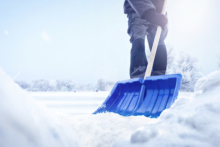
Even in healthy individuals, the American Heart Association said cold weather can constrict arteries, make blood clot more easily and increase heart rate and blood pressure. (Adobe Stock)
This week, Indiana's winter blast has left frigid temperatures and more than 7 inches of snow in its aftermath, and health experts urged people to bundle up before heading outdoors, to reduce health risks.
Dr. Ravi Johar, chief medical officer for UnitedHealthcare and a board member of the American Heart Association of St. Louis, said overexertion while shoveling snow can lead to a heart attack or cardiac arrest. It is a leading cause of winter heart problems, especially for men in their 50s and 60s, and causes about 100 deaths each year.
Johar explained cold weather constricts blood vessels, which increases the heart's demand for blood during exertion.
"You have a combination of the body needing more blood to the heart and getting less flow through it because of the cold weather," Johar outlined. "That unfortunately can lead to a heart attack and it's one of the most common times that you do see a heart attack occurring, is at that time of the year."
Indiana University Health listed symptoms of heart distress as chest pain, nausea, dizziness, fatigue and shortness of breath, and suggested calling 911 right away if you suspect heart trouble, rather than driving yourself to the hospital. In an ambulance, you can get emergency care en route.
Before and after heading outside, eating a light, healthy meal is best. And if you have a medical condition or have not exercised in a while, check with a doctor first. Johar added if the "all clear" is given, talk with your physician about ways to ease into an exercise routine.
"Exercise any time of year will increase your immunity," Johar pointed out. "During cold and flu season, having a little bit better immunity is always beneficial. You do need to make sure you have enough fluids, you need to stay hydrated, even though you don't feel quite as thirsty cause you're not sweating as much, it's real important to make sure you stay hydrated."
What you drink is also important and alcohol is not a good idea. Johar stressed it can make you feel warmer than you are, which can lead to hypothermia. He noted a hot cup of cocoa or apple cider is tempting after being in the cold but the drinks are often loaded with sugar, which also can be dangerous for the heart if you drink too much.
By Terri Dee, Anchor/Producer
Wednesday, January 8, 2025
